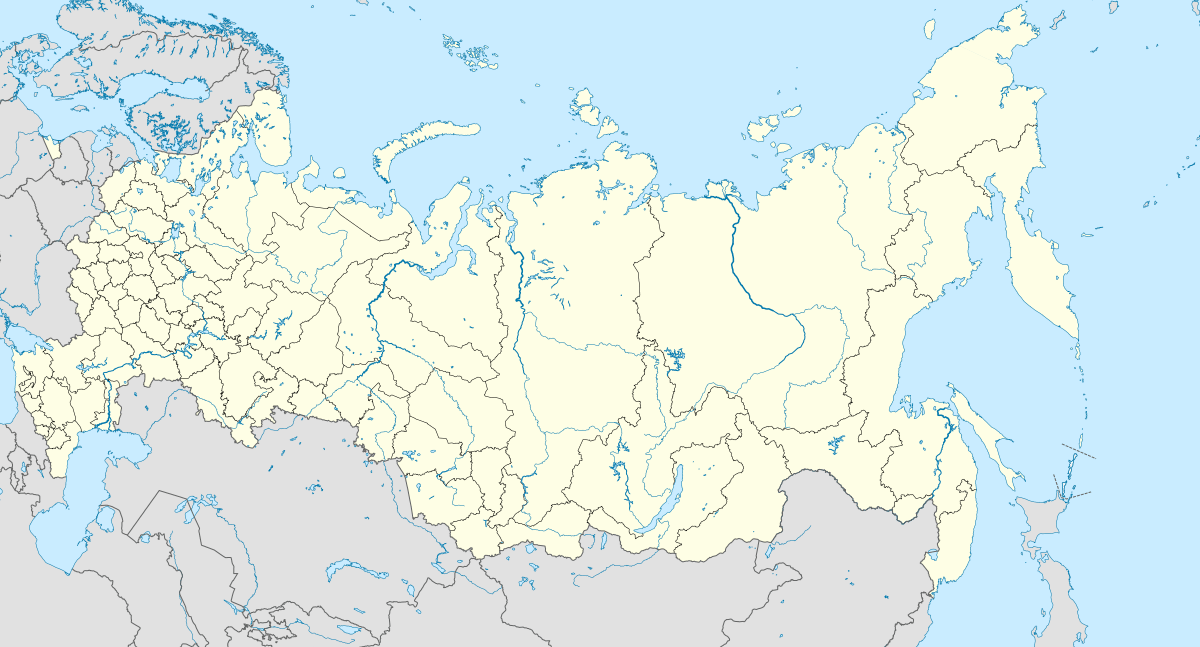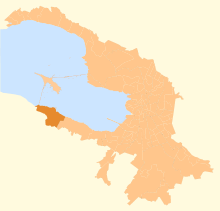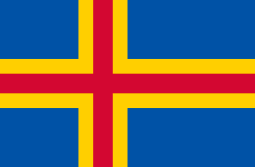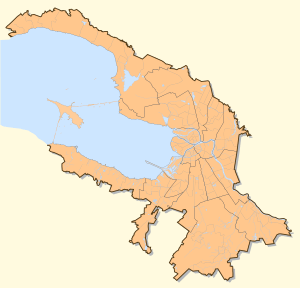Lomonosov, Russia
| Lomonosov Ломоносов (Russian) | |
|---|---|
| - Municipal town - | |
 Lomonosov | |
 |
.png) |
Coat of arms |
Flag |
| Administrative status | |
| Country | Russia |
| Federal subject | Saint Petersburg |
| Statistics | |
| Population (2010 Census) | 42,505 inhabitants[1] |
| Time zone | MSK (UTC+03:00)[2] |
| Founded | 1710 |
| Previous names | Oranienbaum (until 1948) |
| Dialing code(s) | +7 812 |
| Website |
web |
| Lomonosov on Wikimedia Commons | |


Lomonosov (Russian: Ломоно́сов; before 1948: Oranienbaum, Ораниенба́ум) is a municipal town in Petrodvortsovy District of the federal city of Saint Petersburg, Russia, located on the southern coast of the Gulf of Finland, 40 kilometers (25 mi) west of Saint Petersburg proper. Population: 42,505 (2010 Census);[1] 37,776 (2002 Census).[3] Lomonosov is the site of the 18th-century royal Oranienbaum park and palace complex, notable as being the only palace in the vicinity of Saint Petersburg that was not captured by Nazi Germany during World War II.
History
Oranienbaum was granted town status in 1710, and was initially applied to the Oranienbaum palace complex, built between 1710 and 1725 opposite Kronstadt, in the neighbourhood of the royal residence Peterhof Palace, by the architects Giovanni Mario Fontana and Gottfried Johann Schadel, and was intended for Alexander Menshikov, a close associate of Peter the Great. The original name of the town translates to "orange tree" in German (in modern German, the word is Orangenbaum), and is believe to have been derived from the palace complex which had greenhouses to grow exotic plants such as orange trees.
During World War II the town was heavily involved in the Siege of Leningrad, where Red Army forces managed to establish a foothold at Oranienbaum, in the rear of the forces of Nazi Germany. This foothold had a major importance in the launching of the Leningrad–Novgorod Offensive in early 1944, which finally ended the siege (see Leningrad–Novgorod Offensive). In 1948, the town was renamed to its current name Lomonosov, in honor of the scientist, poet and glassblower Mikhail Lomonosov. In 1754, Lomonosov had founded a colored-glass factory near Oranienbaum, in the village of Ust-Ruditsa. An unofficial nickname, Rambov, a Russified contraction of the old name Oranienbaum, is popular among the local residents.
Lomonosov can be reached by suburban train from St. Petersburg's Baltic Terminal to Oranienbaum Station.
People from Oranienbaum
- Igor Stravinsky (1882–1971), composer of modern classical music
- Aleksandr Mostovoi, footballer
International relations
Twin towns and sister cities
Lomonosov is twinned with:




Gallery
_(1780).png) Coat of arms of Lomonosov (Oranienbaum)-1780
Coat of arms of Lomonosov (Oranienbaum)-1780 City gate of Lomonosov
City gate of Lomonosov Kammenoye pavilion at the palace complex of Oranienbaum
Kammenoye pavilion at the palace complex of Oranienbaum Grand Menshikov Palace
Grand Menshikov Palace Grand Menshikov Palace
Grand Menshikov Palace Grand Menshikov Palace
Grand Menshikov Palace
References
- 1 2 Russian Federal State Statistics Service (2011). "Всероссийская перепись населения 2010 года. Том 1" [2010 All-Russian Population Census, vol. 1]. Всероссийская перепись населения 2010 года (2010 All-Russia Population Census) (in Russian). Federal State Statistics Service. Retrieved June 29, 2012.
- ↑ Правительство Российской Федерации. Федеральный закон №107-ФЗ от 3 июня 2011 г. «Об исчислении времени», в ред. Федерального закона №271-ФЗ от 03 июля 2016 г. «О внесении изменений в Федеральный закон "Об исчислении времени"». Вступил в силу по истечении шестидесяти дней после дня официального опубликования (6 августа 2011 г.). Опубликован: "Российская газета", №120, 6 июня 2011 г. (Government of the Russian Federation. Federal Law #107-FZ of June 31, 2011 On Calculating Time, as amended by the Federal Law #271-FZ of July 03, 2016 On Amending Federal Law "On Calculating Time". Effective as of after sixty days following the day of the official publication.).
- ↑ Russian Federal State Statistics Service (May 21, 2004). "Численность населения России, субъектов Российской Федерации в составе федеральных округов, районов, городских поселений, сельских населённых пунктов – районных центров и сельских населённых пунктов с населением 3 тысячи и более человек" [Population of Russia, Its Federal Districts, Federal Subjects, Districts, Urban Localities, Rural Localities—Administrative Centers, and Rural Localities with Population of Over 3,000] (XLS). Всероссийская перепись населения 2002 года [All-Russia Population Census of 2002] (in Russian). Retrieved August 9, 2014.
